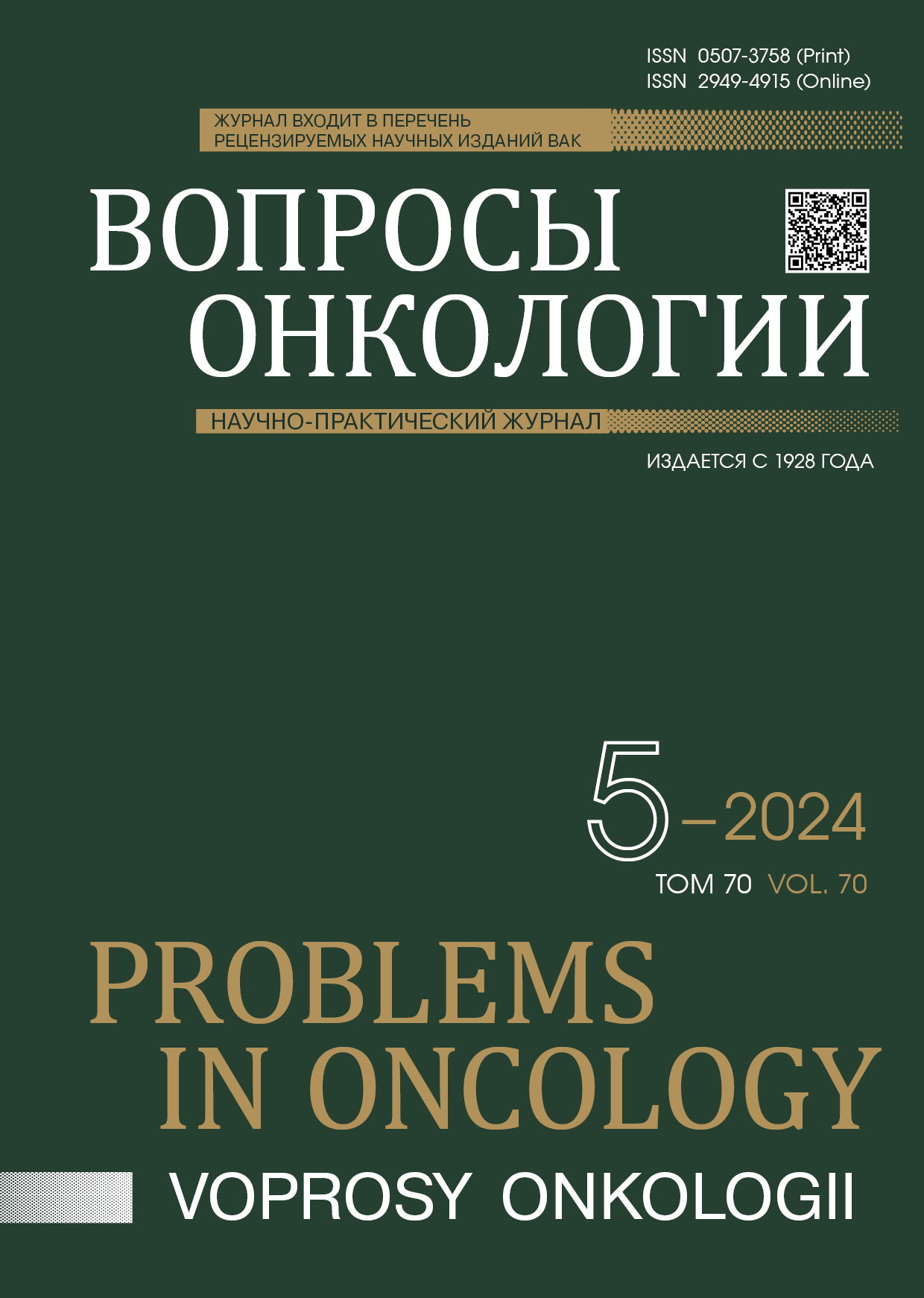Аннотация
Введение. Колоректальный рак занимает лидирующие позиции в структуре онкологической заболеваемости. В результате онкоскрининга диагноз ставится на более ранних стадиях, и чаще пациентам стала проводиться адъювантная химиотерапия. В настоящее время имеются известные факторы прогноза, влияющие на включение в план лечения адъювантной химиотерапии, однако они не включают биологические и молекулярно-генетические особенности опухоли. Возможно, поиск новых прогностических факторов приведет к изменению парадигмы лечения больных с колоректальным раком.
Цель. Ооптимизация выбора адъювантной химиотерапии путем оценки влияния совокупности имеющихся факторов прогноза и дополнительных (индекс пролиферации Ki67, KRAS мутация, экспрессия хемокиновых рецепторов) факторов на безрецидивную выживаемость у пациентов с РОК после радикального хирургического лечения.
Материалы и методы. В исследование было включено 113 пациентов с диагнозом рак ободочной кишки II (группа А) или III стадии (группа В) после проведенного хирургического лечения. Всем пациентам было проведено лечение по имеющимся на тот момент стандартам, так пациентам в группе А было проведено только хирургическое лечение, а пациентам в группе В — комплексное лечение (хирургическое лечение + адъювантная химиотерапия). Все пациенты были под наблюдением в течение 60 мес. и, в зависимости от выявления отдаленных метастазов, были разделены на подгруппы. Далее были оценены клинические характеристики пациентов (возраст, пол, локализация первичной опухоли, характер выполненной операции) и морфологические характеристики опухоли (определение уровня экспрессии Ki-67; наличие и уровня экспрессии хемокинового рецептора CCRX4 и молекулярно-генетический анализ (определение мутации в 12,13 кодонах гена KRAS).
Результаты. Выявлены дополнительные факторы прогноза, влияющие на показатель безрецидивной выживаемости: экспрессия хемокинового рецептора CXCR4, индекс пролиферации Ki-67 и локализация опухоли.
Заключение. Дополнительные факторы прогноза, определенные в результате работы, целесообразно использовать для оптимизации комплексного лечения у пациентов с РОК.
Библиографические ссылки
Каприн А.Д. Состояние онкологической помощи населению России в 2022 году. Москва. 2023; 239.- ISBN 978-5-85502-283-4. [Kaprin A.D. The state of oncological care for the population of Russia in 2022. 2023; 239.-ISBN 978-5-85502-283-4 (In Rus)].
Практические рекомендации по лечению злокачественных опухолей Российского общества клинической онкологии, версия 2023. RUSSCO. 2023; 451-453.-URL: https://rosoncoweb.ru/standarts/RUSSCO/. [Practical recommendations for the treatment of malignant tumors of the Russian Society of Clinical Oncology, version 2023. RUSSCO. 2023; 451-453.-URL: https://rosoncoweb.ru/standarts/RUSSCO/ (In Rus)].
Gerdes J., Schwab U., Lemke H., et al. Producing of a mouse monoclonal antibody reactive with a human nuclear antigen associated with cell proliferation. Int J Cancer. 1983; 31(1): 13-20.-DOI: https://doi.org/10.1002/ijc.2910310104.
Conlin A., Smith G., Carey F.A., et al. The prognostic significance of K-ras, p53, and APC mutations in colorectal carcinoma. Gut. 2005; 54(9): 1283-6. DOI: https://doi.org/10.1136/gut.2005.066514.
Tie J., Lipton L., Desai J., et al. KRAS mutation is associated with lung metastasis in patients with curatively resected colorectal cancer. Clin Cancer Res. 2011; 17(5): 1122-30.-DOI: https://doi.org/10.1158/1078-0432.
Schlechter B.L., Stebbing J. CCR5 and CCL5 in metastatic colorectal cancer. J ImmunoTher Cancer. 2024; 12: e008722.-DOI: https://doi.org/10.1136/jitc-2023-008722.
Hanahan D., Weinberg R. The hall marks of cancer: the next generation. Cell. 2011; 144(5): 646-74.-DOI: https://doi.org/10.1016/j.cell.2011.02.013.
Susek K.H., Karvouni M., Alici E., et al. The role of CXC chemokine receptors 1–4 on immune cells in the tumor microenvironment. Front Immunol. 2018; 9: 2159.-DOI: https://doi.org/10.3389/fimmu.2018.02159.
Kato M., Kitayama J., Kazama S., et.al. Expression pattern of CXC chemokine receptor-4 is correlated with lymph node metastasis in human invasive ductal carcinoma. Breast Cancer Res. 2003; 5: R144-R150.-DOI: https://doi.org/10.1186/bcr627.
Rivera C.G., Bader J.S., Popel A.S. Angiogenesis-associated crosstalk between collagens, CXC chemokines, and thrombospondin domain-containing proteins. Ann Biomed Eng. 2011; 39(8): 2213-22.-DOI: https://doi.org/10.1007/s10439-011-0325-2.
Shi Y., Riese D.J., Shen J. The role of the CXCL12/CXCR4/CXCR7 chemokine axis in cancer. Front Pharmacol. 2020; 11.-DOI: https://doi.org/10.3389/fphar.2020.574667.
Bedeer A.E., El-Ghaffar Heabah N.A. Evaluation of C-X-C chemokine receptor type 4 (CXCR4) and Peroxisome proliferator-activated receptor gamma (PPAR-γ) expression in colorectal carcinoma: Relation to the available clinicopathological parameters. Indian J Pathol Microbiol. 2023; 66(3): 465-471.-DOI: https://doi.org/10.4103/ijpm.ijpm_481_21.
Li J., Huang L., Zhao H., et al. The role of interleukins in colorectal cancer. Int J Biol Sci. 2020; 16(13): 2323-2339.-DOI: https://doi.org/10.7150/ijbs.46651.
Ottaiano A., Scala S., Normanno N., et al. Prognostic and predictive role of CXC chemokine receptor 4 in metastatic colorectal cancer patients. Appl Immunohistochem Mol Morphol. 2020; 28(10): 755-60.-DOI: https://doi.org/10.1097/pai.0000000000000828.
Iveson T., Sobrero A.F., Yoshino T., et al. Prospective pooled analysis of four randomized trials investigating duration of adjuvant (adj) oxaliplatin-based therapy (3 vs 6 months {m}) for patients (pts) with high-risk stage II colorectal cancer (CC). J Clin Oncol. 2019; 37(15_suppl): 3501-3501. DOI: https://doi.org/10.1200/jco.2019.37.15_suppl.3501.
Herrera M., Mezheyeuski A., Villabona L., et al. Prognostic interactions between FAP+ fibroblasts and CD8a+ T cells in colon cancer. Cancers. 2020; 12(11): 3238.-DOI: https://doi.org/10.3390/cancers12113238.
Azcue P., Guerrero Setas D., Encío I., et al. A novel prognostic biomarker panel for early-stage colon carcinoma. Cancers. 2021; 13(23): 5909.-DOI: https://doi.org/10.3390/cancers13235909.
Dienstmann R., Salazar R., Tabernero J. Personalizing colon cancer adjuvant therapy: selecting optimal treatments for individual patients. J Clin Oncol. 2015; 33(16): 1787-96.-DOI: https://doi.org/10.1200/jco.2014.60.0213.
Kim J., Mori T., Chen S.L., et al. Chemokine receptor CXCR4 expression in patients with melanoma and colorectal cancer liver metastases and the association with disease outcome. Ann Surg. 2006; 244(1): 113-20.-DOI: https://doi.org/10.1097/01.sla.0000217690.65909.9c.
Pircher A., Hilbe W., Heidegger I., et ak. Biomarkers in tumor angiogenesis and anti-angiogenic therapy. Int J Mol Sci. 2011; 12(10): 7077-99.-DOI: https://doi.org/10.3390/ijms12107077.
Grimm F., Maurus R., Beschorner R., et al. Ki-67 labeling index and expression of p53 are non-predictive for invasiveness and tumor size in functional and nonfunctional pituitary adenomas. Acta Neurochir. 2019; 161(6): 1149-56.-DOI: https://doi.org/10.1007/s00701-019-03879-4.
Stintzing S., Tejpar S., Gibbs P., et al. Understanding the role of primary tumour localisation in colorectal cancer treatment and outcomes. Eur J Cancer. 2017; 84: 69-80.-DOI: https://doi.org/10.1016/j.ejca.2017.07.016.
Tie J., Lipton L., Desai J., et al. KRAS mutation is associated with lung metastasis in patients with curatively resected colorectal cancer. Clin Cancer Res. 2011; 17(5): 1122-30.-DOI: https://doi.org/10.1158/1078-0432.ccr-10-1720.

Это произведение доступно по лицензии Creative Commons «Attribution-NonCommercial-NoDerivatives» («Атрибуция — Некоммерческое использование — Без производных произведений») 4.0 Всемирная.
© АННМО «Вопросы онкологии», Copyright (c) 2024

